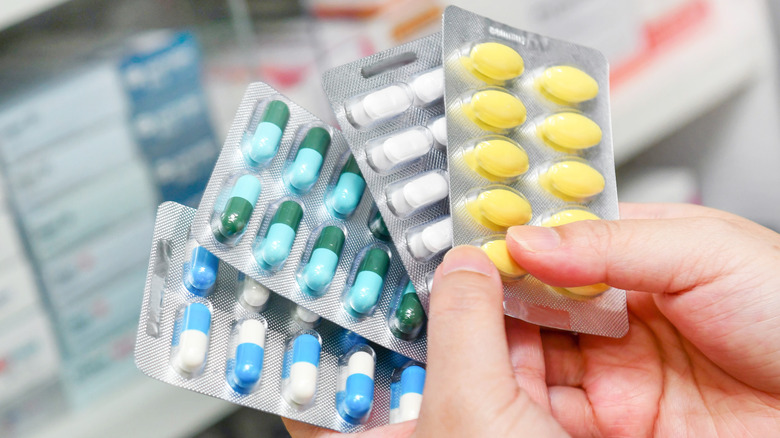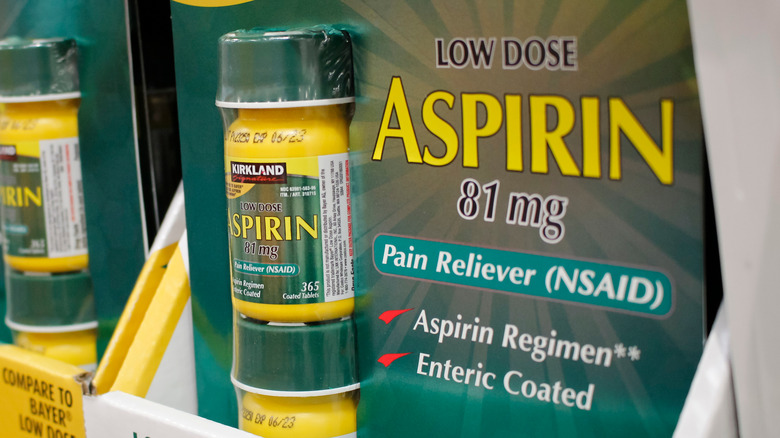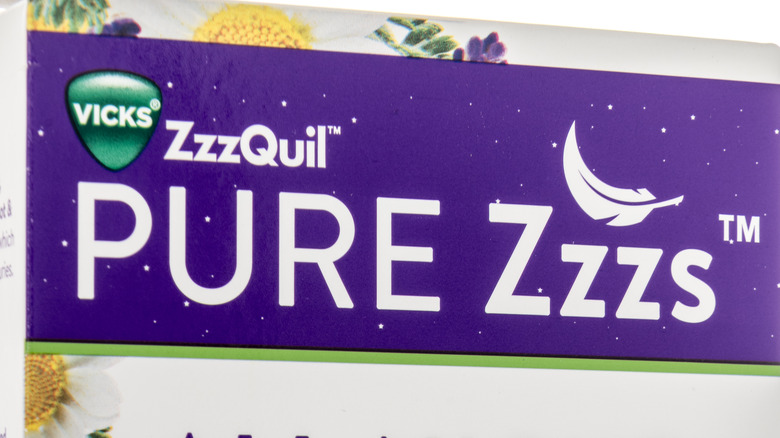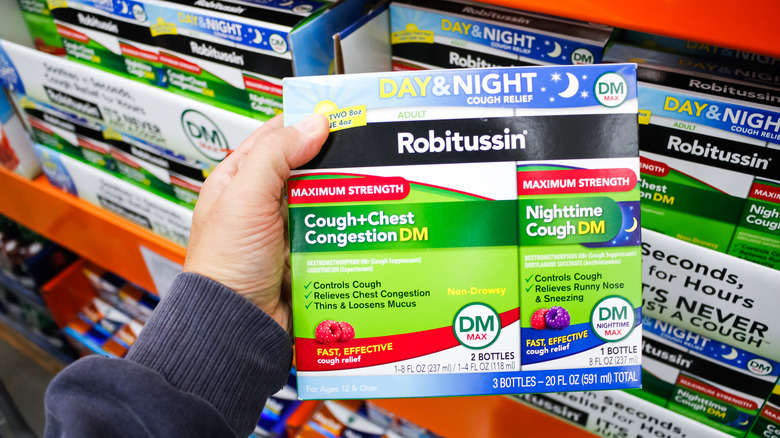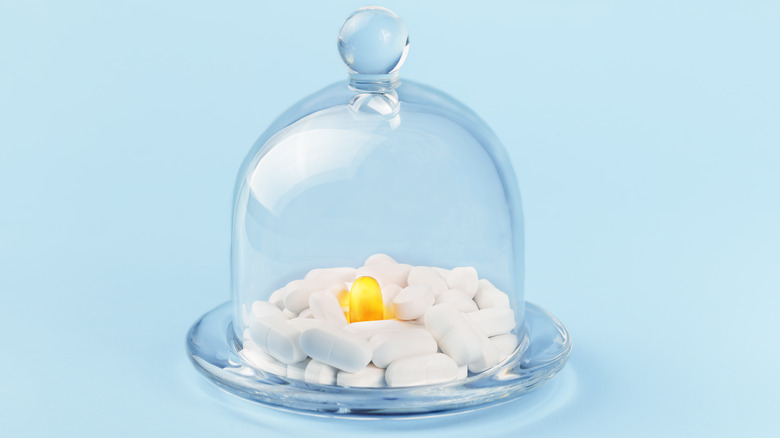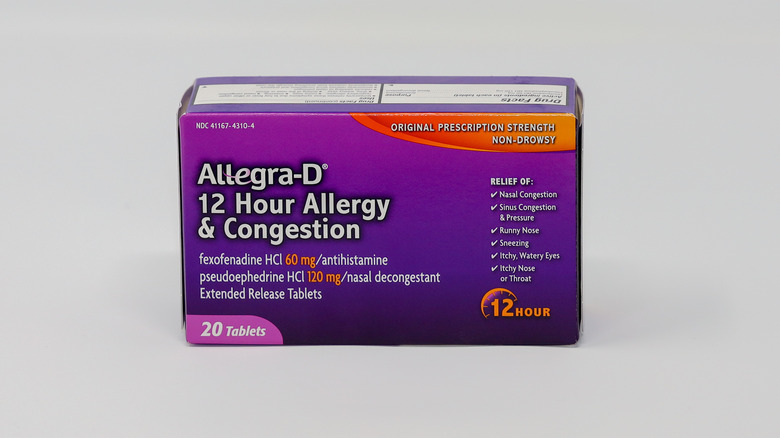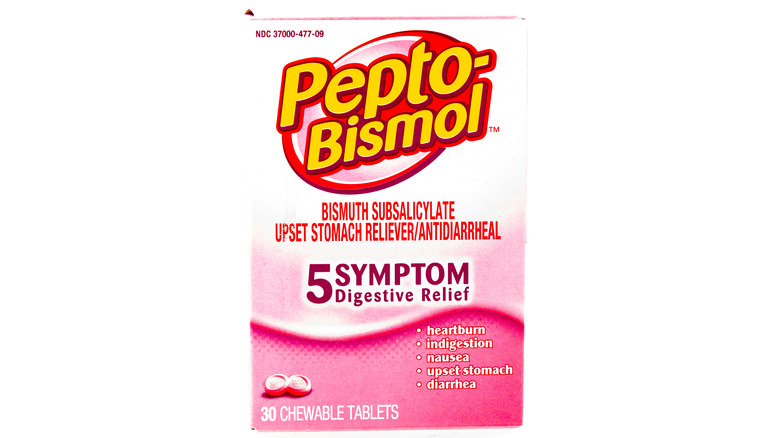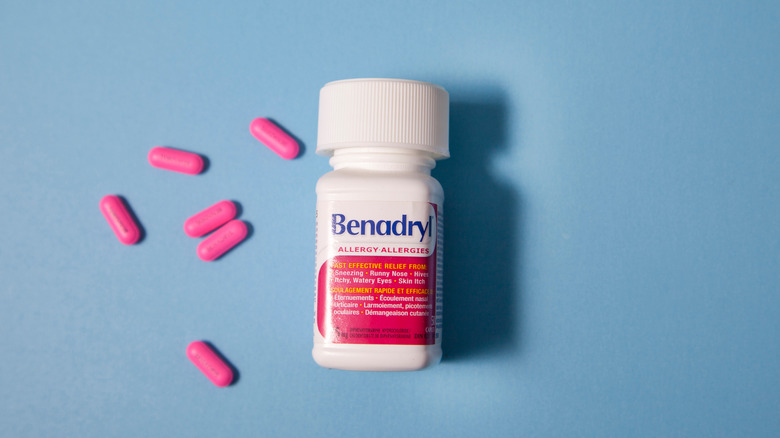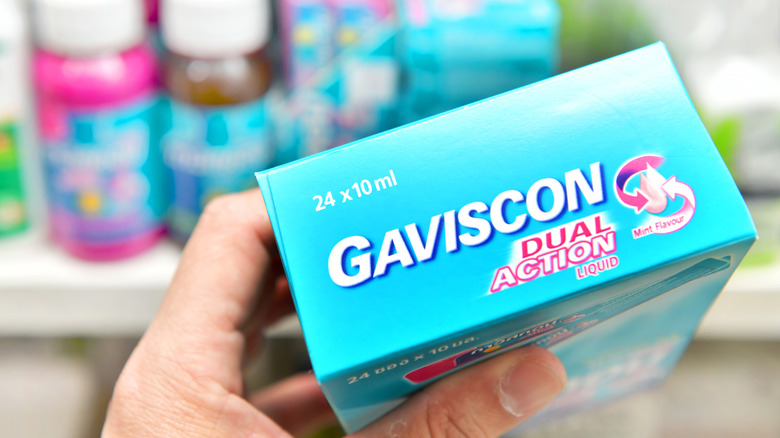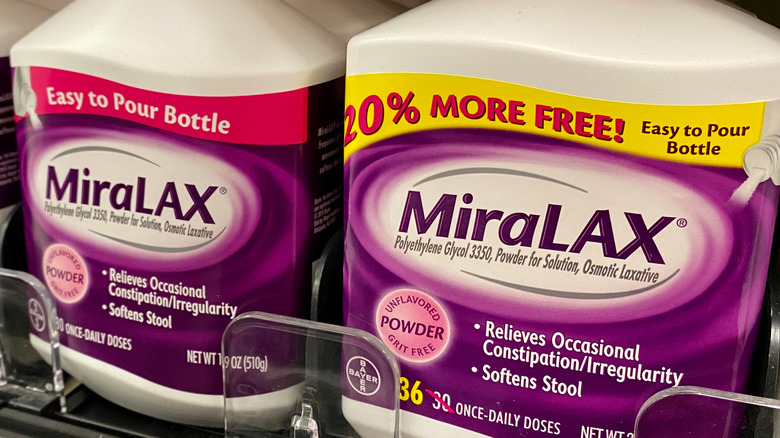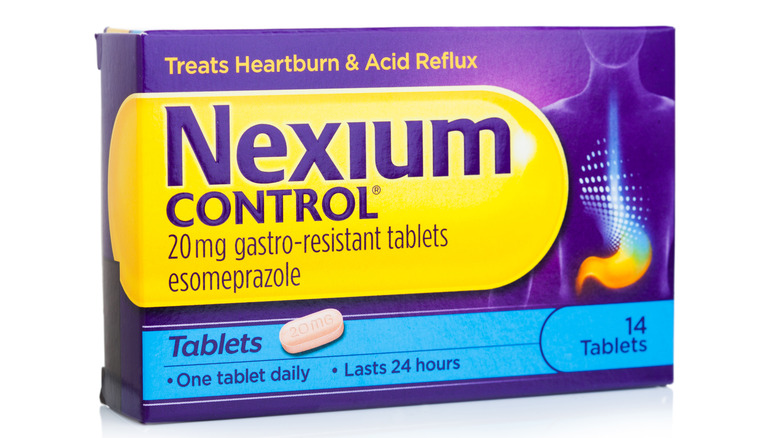Over-The-Counter Medications You Shouldn't Be Taking Together
Drug interactions are a growing problem, according to the FDA, with the dangers multiplying as more medications land on shelves. That includes over-the-counter medications and supplements, which are often deemed the "perpetrators" in drug-on-drug interaction situations, according to a 2021 academic paper published in Therapeutic Drug Monitoring. According to the study authors, the drug categories most frequently seen in drug interactions include a number of over-the-counter drugs that will be familiar to many — from herbal treatments to NSAIDs.
Drug interactions come in several varieties. First, there's "therapeutic duplication," in which two drugs have the same effect (via Merck Manual). This means the person taking them is taking twice as much as was really intended. Then there is "therapeutic antagonism," in which two drugs that have the opposite effect of one another, end up canceling one another out. Finally, "therapeutic alteration" may change how the body absorbs, distributes, metabolizes, or excretes another drug.
Painkillers and multi-action cold and flu medications
Catching a cold or flu often begins with achiness, and often diffuse achiness at that. Sometimes, before we even realize it's a cold or flu, we're already taking a painkiller – likely aspirin, acetaminophen, ibuprofen, or naproxen — to deal with that gosh darn achiness. As the hours wear on, however, and you begin to experience nasal congestion, drippiness, or the beginnings of a cough, you may reach for Vicks Dayquil Cold & Flu Relief, Alka-Seltzer Plus Cold Formula, Ohm Non-Drowsy Cold & Sinus Relief Caplets, or Aleve Cold and Sinus.
What you might not realize, however, is that Dayquil contains acetaminophen along with other cold-relieving ingredients. Your Alka-Seltzer cold formula contains aspirin along with its cold relievers. The Ohm caplets contain ibuprofen along with a decongestant, while the Aleve cold medicine has naproxen as its painkilling ingredient. Doubling your aspirin, ibuprofen, or naproxen dose — or taking any two together — is problematic primarily because both aspirin and ibuprofen can cause gastrointestinal distress, including gastric bleeding in people who have or are predisposed to ulcers, according to Medical News Today.
Taking too much acetaminophen by taking it first alone and then in your multi-action cold or flu medication is potentially more problematic, according to a paper published by the National Institute of Diabetes and Digestive and Kidney Diseases. Acetaminophen has the potential to damage the liver when taken in excess.
Ibuprofen and daily low-dose aspirin
There's another reason you may want to be extra careful when choosing a cold and flu medicine after having already taken a painkiller. "Laboratory studies and studies in normal volunteers have suggested a possible adverse interaction between aspirin and ibuprofen," according to the authors of a study published in the Journal of Basic and Clinical Pharmacology and Toxicology. And this particular adverse reaction is not merely a therapeutic duplication, but also in the nature of therapeutic antagonism.
In other words, let's say you're taking low-dose aspirin as a prophylactic against heart disease every day along with your other pills, often without thinking much about it. Then you catch a cold and take a cold medicine containing ibuprofen. Or perhaps you just feel a headache coming on and take ibuprofen since it's stronger than your low-dose aspirin. In either case, in addition to causing gastrointestinal distress from therapeutic duplication, you may run the risk of rendering the aspirin less effective in protecting you against heart attack risk.
Specifically, aspirin does some of its heart-protective work on "platelet cyclooxygenase," according to the study. However, Ibuprofen prevents aspirin from gaining access thereto. The interaction between aspirin and ibuprofen is more likely in those who take more ibuprofen. The interaction is also seen as more worrisome for those at "high cardiovascular risk." Accordingly, the study authors concluded, "A reasonable strategy might be to advise aspirin takers to avoid chronic ibuprofen."
Acetaminophen and ZzzQuil Pure Zzzs Cool Nights tablets
It's not uncommon to feel a headache coming on and reach for an over-the-counter painkiller without giving all that much thought to potential drug interactions. And although you may realize that acetaminophen can cause liver damage at higher dosages, you may not realize that it can also cause liver damage at smaller doses, per Harvard Health. After all, it's only natural to make the general assumption that if a drug is available over-the-counter, there isn't much chance it's going to do any unintentional harm. Unfortunately, that's not the case, as Merck Manuals makes abundantly clear.
And here's another wrinkle: Although some over-the-counter drugs do not contain acetaminophen, they can contain other ingredients capable of causing liver damage when taken in combination with acetaminophen. For example, ZzzQuil Pure Zzzs Cool Nights tablets are meant to support good sleep by reducing night sweats thanks to black cohosh. Unfortunately, this herb can be risky for your liver on its own — even without mixing it with an over-the-counter drug, per a research paper published in British Menopause Society Journal. The combination of acetaminophen and black cohosh presents an even greater risk of liver damage, according to Drugs.com.
ZzzQuil Pure Zzzs and Robitussin DM
If you're already taking ZzzQuil's Pure Zzzs melatonin products, you should steer clear of the cough medicine Robitussin DM and any other cough medicine containing the active ingredient dextromethorphan. Dextromethorphan is the active ingredient in a number of cough medicines that are designed to loosen chest congestion while also controlling the related cough. However, taking dextromethorphan with any drug that contains the over-the-counter sleep-aid, melatonin, can lead to dizziness, drowsiness, confusion, difficulty concentrating, and other cognitive issues, according to Drugs.com.
If you're looking for a good night's sleep as well as a decongesting cough suppressant, you'll be glad to know that Robitussin DM has a nighttime cough formula that uses the active ingredient in the drowsy-inducing allergy drug, Benadryl, to help you fall asleep and stay asleep. This should eliminate your need for melatonin, which should also not be combined with Benadryl, per Drugs.com.
Aspirin and fish oil supplements
So, you're taking fish oil tablets because of all the great health benefits associated with omega-3 polyunsaturated fatty acids. Good for you! And perhaps all is well, except maybe you're starting to feel a sore throat coming on, and you'd rather not let it impact the rest of your day. So, you check the medicine cabinet and you find you have a bottle of aspirin. Excellent, you think to yourself, that ought to do it. Right? Well, not so fast.
Fish oil may actually increase the risk of bleeding when combined with other medications that are also known to increase bleeding. That includes aspirin, according to Drugs.com. This increased bleeding risk doesn't simply apply to superficial cuts, but also bruising and other forms of internal bleeding, like bleeding in the digestive tract, which can present as vomiting blood or bloody or tarry stool.
In addition to increasing the propensity to bleed, these two over-the-counter products together can cause dizziness and lightheadedness. For all these reasons, Drugs.com recommends that you check with your doctor before taking aspirin under any circumstances when you're already taking fish oil capsules. For precisely the same reason, you should think twice before mixing ibuprofen and fish oil supplements.
Sudafed and Allegra if you're prescribed an MAO inhibitor
It's not uncommon to take both decongestants and antihistamines when plagued by nasal congestion and sinus pain with a cold or flu, especially one that rears its head in the middle of allergy season. One combination is known to be quite safe and effective for most people, and that is the combination of the over-the-counter decongestant pseudoephedrine, which is sold under the brand name Sudafed, and the non-drowsy antihistamine fexofenadine, which is sold under the brand name Allegra. There is also a prescription-only version of this combination. However, the safety changes if you are on another drug known as an MAO inhibitor (MAOI).
MAOIs are a class of antidepressants that work differently from the class known as SSRIs. MAOIs include Azilect, Marplan, Parnate, and Nardil, and while they aren't nearly as common as the SSRIs, such as Prozac or Zoloft, they are nevertheless still prescribed in some cases. If you are on a regularly prescribed MAOI, or if you were in the last 14 days, you should not use the combination of pseudephedrine and fexofenadine (whether as over-the-counter Sudafed and Allegra or in a unified prescription-strength form).
Michigan Medicine warns, "A dangerous drug interaction could occur." Additionally, Drugs.com specifies that combining these medications can lead to a dangerous spike in blood pressure, with death as a possible outcome.
Aspirin and Pepto-Bismol
The active ingredient in the chalky pink drug known as Pepto-Bismol, which people take for gastrointestinal discomfort and diarrhea, is bismuth subsalicylate, according to Drugs.com. Many who regularly take Pepto-Bismol or other drugs containing bismuth subsalicylate don't realize that the active ingredient is similar to the active ingredient in aspirin, which is also a salicylate, per NHS. As a result, Pepto-Bismol, Kaopectate, and all of the other over-the-counter drugs that contain bismuth subsalicylate are likely not appropriate for use by people taking daily doses of aspirin.
In addition, they may not be advised for anyone who has recently taken aspirin. "Combining these medications may increase the risk of side effects in the gastrointestinal tract such as inflammation, pain, bleeding, and ulceration," Drugs.com explains. "Bruising and other bleeding complications may also occur." While these side effects can be lessened by taking these medications with food, the fact remains that, as a general matter, taking both aspirin and bismuth subsalicylate is "not recommended," according to Drugs.com.
Benadryl and Zyrtec
When seasonal allergies hit, it can make life at least mildly miserable, what with all the congestion, nasal inflammation, red eyes, and itchy throat. Oral antihistamines work by lowering the activity of your body's histamines, which are chemicals that your immune system releases in response to a perceived threat such as the presence of or exposure to allergens to which your immune system has developed a reaction (via GoodRx).
Benadryl, which makes use of the active antihistamine ingredient diphenhydramine, is known as the "first generation" of antihistamines because it came first in time (via American Academy of Family Physicians). Benadryl is highly effective at clearing allergy symptoms, but the price is often drowsiness, not to mention dry eyes, dry mouth, constipation, and dizziness.
Next-generation antihistamines were developed to do the same thing as Benadryl, but with fewer side effects, for a longer period of time, and ideally, without drowsiness. Next-generation antihistamines include Zyrtec (active ingredient: cetirizine), as well as Claritan (active ingredient: loratadine) and Allegra (active ingredient: fexofenadine). But there's a paradox, according to Drugs.com. When you take Zyrtec with Benadryl together, perhaps thinking that you'll get double the benefits and only half the sleepiness, you're in for a surprise. Taking these two together may increase drowsiness and related symptoms (such as dizziness and lack of physical coordination) and may also cause temporary cognitive impairment. The same isn't necessarily true of taking Claritan or Allegra with Benadryl, but doing so raises the specter of therapeutic duplication.
Milk of magnesia and Gaviscon
Magnesium is one of those amazing minerals that serves multiple purposes in the human body. It regulates blood pressure and heart rhythm, for starters, and supports healthy bones, according to WebMD. But it's also been observed that adults who are magnesium deficient tend to have higher markers for inflammation, which is, itself, associated with a number of health conditions, including diabetes. Further, magnesium may combat depression and improve athletic performance, according to Healthline.
Just as not enough magnesium is problematic, though, so too is getting too much. In fact, an excess can cause serious consequences, including gastrointestinal difficulties such as diarrhea, nausea, and vomiting, lethargy, muscular weakness, low blood pressure, respiratory distress, and even cardiac arrest (via Healthline).
It would be unusual to have too much magnesium in your system solely as a result of eating a healthy diet rich in the mineral. However, taking certain over-the-counter medications together can present that risk. The challenge here for the consumer is recognizing which over-the-counter medications contain magnesium. Clearly, magnesium supplements do. But did you know Gaviscon, the antacid treatment, contains magnesium in all of its formulations? So does milk of magnesia, which is taken to relieve constipation, and Pedia-Lax Chewable Tablets, which are a children's constipation medication. Combining these magnesium-based medications is especially dangerous for people with reduced kidney function, according to Drugs.com.
Ex-lax and MiraLAX
Constipation is defined by the National Institute of Diabetes and Digestive and Kidney Diseases as having "fewer than three bowel movements a week," plus stools that are hard, dry, or otherwise difficult or painful to eliminate. Fortunately, there are a lot of solutions, including eating more fiber, drinking more water, and if all else fails, taking the occasional laxative. Laxatives are available widely over the counter and are sold in a number of formulations (via WebMD). As highlighted, magnesium-based laxatives should not be taken with other magnesium-based medications, including magnesium supplements.
Senna-based laxatives such as Ex-Lax and laxatives with the active ingredient polyethylene glycol 3350, such as MiraLAX, are also commonly taken. Although there are no known interactions between either of these formulations and magnesium supplementation, Drugs.com warns that senna and polyethylene glycol 3350 should not be used together, or even in sequence. Doing so can put you at the risk for ulcers of the colon and ischemic colitis. Rare though these are, they are potentially life-threatening.
Nexium and Prilosec or either medication with vitamin B12
Therapeutic alteration is a type of drug interaction in which one drug changes how the body absorbs, metabolizes, distributes, or excretes another drug. Therapeutic alteration is much less common than therapeutic duplication or antagonism, but it does happen. Taking Nexium and vitamin B12 is an example of this type of drug interaction.
Nexium, which contains the active ingredient esomeprazole, lowers the acid in your stomach, thereby relieving the uncomfortable sensations associated with reflux and also lowering the risk of cancer of the esophagus, which goes along with untreated chronic gastric reflux (via WebMD). But when Nexium or any other proton pump inhibitor (PPI) reduces the acid in your gut, it's also making it more difficult for your body to absorb vitamin B12, even if you're taking supplements, according to Drugs.com.
Vitamin B12, also known as cyanocobalamin, is an important nutrient, especially when it comes to supporting the body's production of red blood cells. A chronic deficiency in vitamin B12 can result in anemia, particularly after taking Nexium or other proton pump inhibitors consistently over a period of two years or more, according to a 2013 study published in the Journal of the American Medical Association. Additionally, because esomeprazole is similar to omeprazole (brand names: Prilosec and Prilosec OTC) another PPI, you should not combine these two medications, advised WebMD.

